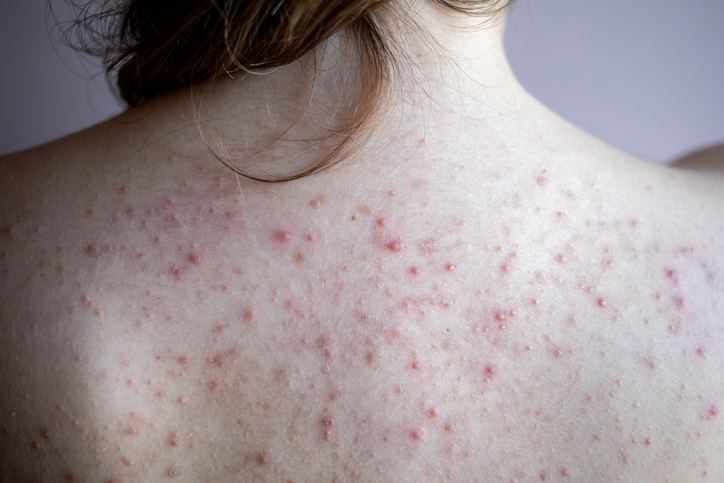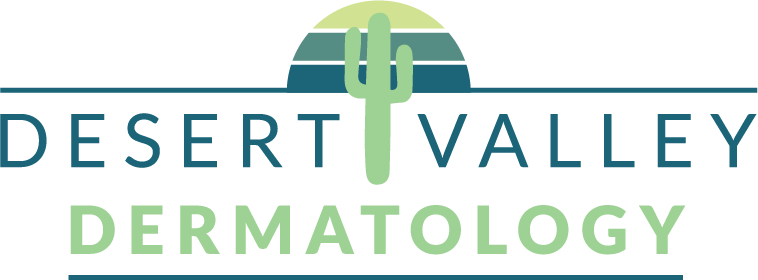Effective Acne Treatment in Phoenix
Desert Valley Dermatology’s acne dermatologists specialize in providing personalized and targeted acne marks treatment. Our team of experienced dermatologists and advanced equipment provides the most effective and non-invasive solutions to address scars and any other skin concerns.
While acne may not be a life-threatening condition, it can still cause significant emotional distress. Acne can affect your self-esteem, confidence, and overall quality of life.
With the right plan from an acne treatment dermatologist, you can improve your skin’s appearance and enhance your confidence and mental health.
Acne can be an aggravating and stubborn skin condition, but learning its causes will allow you to address it successfully. By identifying the cause of your acne, you can work with a dermatologist to develop a personalized treatment plan to manage and prevent future breakouts effectively.

What Is Acne?
Acne is a chronic medical condition involving the pilosebaceous units, which are the hair follicles and associated sebaceous glands. This common disorder primarily affects adolescents but can also occur later in life.
Types of Acne
Most people have a combination of acne lesions, but the two overarching types are inflammatory and non-inflammatory.
Inflammatory Acne
Inflammatory acne occurs when the body’s immune system triggers an inflammatory response. This form of acne causes redness, swelling, and inflammation and can be painful to the touch.
Inflammatory acne can include the following types of lesions:
Papule
Small, raised bumps on the skin. They are either red or pink and can form singly or in groups. Papules can vary in size and may be accompanied by symptoms such as itching or tenderness.
Pustule
A type of acne lesion characterized by a red, tender skin bump containing a white or yellow pus-filled center.
Nodule
A type of acne lesion that forms deep within the skin. Nodules are characterized by a hard, raised, and sometimes painful bump on the skin.
Cyst
A large, pus-filled sac located beneath the skin’s surface. Cysts are more severe than other types of acne blemishes and often require medical treatment.
Non-Inflammatory Acne/Comedones
Non-inflammatory acne, or comedonal acne, is a milder form of acne that manifests as bumps but not redness, pain, or swelling.
Whiteheads
Small, round, white bumps on the skin’s surface.
Blackheads
Similar to whiteheads, but the pores are open, and the oil and dead skin cells turn dark due to exposure to air.
Milia
Clusters of tiny white keratin-filled bumps that commonly form around the eyes, though they sometimes form on the nose and cheeks.
What Causes Acne?
Acne is caused by a combination of factors, including excess oil production, clogged hair follicles, bacteria, and inflammation. When the hair follicles become clogged with oil and dead skin cells, this can create an environment where bacteria can thrive, leading to the formation of pimples and other types of acne.
Hormonal changes in the body can also encourage the development of acne. Hormones can stimulate the sebaceous glands, causing them to create more oil. Certain medications, such as corticosteroids and progestin birth control, can also contribute to the development of acne.
Finally, factors such as stress, diet, and genetics may also play a role in the development of acne.
What is the Most Effective Acne Treatment?
Finding an effective treatment can be a crucial step towards clearer, healthier-looking skin. While there are several acne removal options available, some treatments will be more effective for your unique skin condition than others.
The appropriate treatment for your acne will depend upon the following factors:
- Type of acne
- Location of the acne
- Previous treatments for acne
- When you first developed acne
- Age
- Whether scarring has occurred
Acne Spot Treatments
Acne spot treatments are designed to target individual pimples or breakouts. Some popular ingredients in acne spot treatments include salicylic acid, benzoyl peroxide, tea tree oil, and sulfur.
If you are experiencing persistent breakouts, a stronger topical medication might be appropriate. These may include a combination of the following:
- Topical retinoids
- Topical antibiotics
- Azelaic acid
Acne spot treatments are most effective when used to supplement a skincare routine that includes cleansing and moisturizing.
Hormonal Acne Treatments
These treatments are sometimes recommended for more severe inflammatory acne, like nodules or cysts. While hormonal acne can appear anywhere on the face, neck, back, and chest, lesions tend to form on the chin and jawline.
Some effective treatments for hormonal acne include birth control pills, spironolactone, and certain types of antibiotics. Maintaining an active and healthy lifestyle by eating a balanced diet, staying hydrated, and getting regular exercise can help balance hormones and reduce the likelihood of hormonal acne.
Acne Dermatologist in Phoenix
If you are struggling with acne, seeking professional help is crucial for effective treatment. We offer acne treatment in Phoenix, AZ, tailored to your specific needs.
From topical to oral medications, our team has the expertise to help you achieve clearer, healthier skin.
Don’t let acne hold you back from feeling confident and comfortable in your skin. Schedule a consultation with Desert Valley Dermatology today to take your first steps towards clearer skin.
